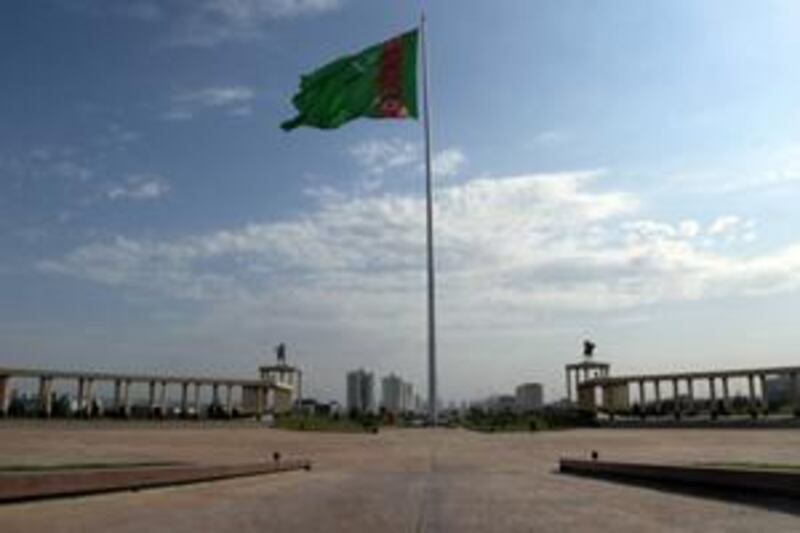Two UAE oilfield services firms are part of a five-company consortium that has won US$9.71 billion of contracts to develop Turkmenistan's biggest gasfield. The central Asian state said its government-owned gas company, Turkmengaz, awarded the deals to a group consisting of China National Petroleum Corporation (CNPC), Abu Dhabi's Petrofac Emirates, Dubai's Gulf Oil and Gas, and South Korea's LG International and Hyundai Engineering to develop the South Yolotan field, which is thought to contain about 6 trillion cubic metres of gas. Like the gas in some fields in Abu Dhabi, the Turkmen gas is deeply buried below desert sands and contains toxic hydrogen sulphide. But the project could boost Turkmenistan's gas output by 45 per cent. Petrofac Emirates, a joint venture between the British oilfield services firm Petrofac and the Abu Dhabi Government-owned investment company Mubadala Development, won $4bn of contracts to develop 20 billion cu metres of annual production capacity, and to design and build a sulphur extraction plant and other infrastructure for the huge project. "This is Petrofac's first project award in Turkmenistan, although we have been building our relations with Turkmengaz for some time," said Maroun Semaan, the group chief operating officer of Petrofac. It represents Mubadala's second major investment in central Asia as the company is also part of a consortium exploring for oil and gas in the Caspian Sea off Kazakhstan. Gulf Oil, a private company, is to build underground infrastructure for the Turkmen project under a $1.15bn contract. It is one of two Dubai oil firms already active in Turkmenistan. Gulf Oil in 2005 helped develop a project to reduce gas flaring at one of the country's oilfields in 2005 and capture the gas for export, its website says. CNPC won a $3.13bn deal to develop 10 billion cu metres of annual production capacity from South Yolotan, and the two Korean firms received a $1.49bn order for another desulphurisation plant. The launch of the strategic central Asian gas development comes just two weeks after Hu Jintao, the Chinese president, and the leaders of Turkmenistan, Kazakhstan and Uzbekistan opened a gas transmission link between Turkmenistan's eastern desert, where South Yolotan is located, and western China as part of a proposed 1,833km pipeline to connect all four countries. Both projects are viewed as crucial to assisting Turkmenistan and some of its neighbours to reduce their economic dependence on gas exports to Russia, while helping to satisfy China's growing thirst for the fuel. "This project has not only commercial or economic value. It is also political," the Turkmen president Kurbanguly Berdymukhamedov said at the pipeline inauguration. In May, China agreed to lend Turkmenistan $3bn to develop South Yolotan, which was appraised last year by the British firm Gaffney, Cline and Associates and found to contain between 4 trillion and 14 trillion cu metres of gas, with 6 trillion cu metres being the "best estimate". "These potentially significant reserves should enable Turkmenistan to deal more assertively with its existing customers, and to legitimately establish its credentials as a major exporter to both the European and East Asian markets," Hamish McArdle and Mark Rowley of the Houston law firm Baker Botts, which advises major oil companies, said in a recent report. Petrofac, CNPC, LG and Hyundai are all to receive loans from the China State Development Bank as part of their financing for the South Yolotan project. CNPC said it stands to receive 3.13 billion cu metres of gas every year from the field, or more than 10 per cent of its output, as part of its deal. The gas would flow through the new pipeline, which is expected to deliver up to 40 billion cu metres of gas a year to China by 2013. Turkmenistan already has 7.94 trillion cu metres of proved gas reserves, putting it in fourth place in global rankings, and produced 66.1 billion cu metres last year. It also supplies gas to Iran and is planning to double those exports through a new pipeline under construction. Turkmenistan has also expressed interest in supplying the proposed Nabucco gas pipeline to Europe, which would bypass Russia. Relations between the two former Soviet republics suffered a major setback in April after a pipeline explosion halted Turkmen gas exports to Russia. Turkmenistan accused the Russian gas monopoly Gazprom of causing the rupture. The company denied the allegation, but later sought to renegotiate its contract with Turkmenistan after a steep drop in European demand for Russian gas caused by the recession. Last week, Gazprom sought to end the dispute by agreeing to buy 30 billion cu metres a year of gas from Turkmenistan and build a pipeline to carry untapped Caspian reserves from the west of the country to Europe. Dragon Oil, a company controlled by the Dubai Government, is another UAE company active in Turkmenistan. It produces oil and gas from a Caspian Sea concession. @Email:tcarlisle@thenational.ae
UAE firms grab slice of $10bn Turkmenistan gas deal
Two UAE oilfield services firms are part of a consortium that has won US$9.71 billion of contracts to develop Turkmenistan's biggest gasfield.

Editor's picks
More from the national




